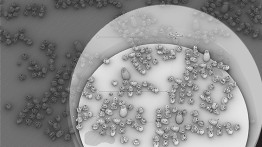Panel Discussion and Book Launch | Jeffrey Nesbit: Nature of Enclosure
Tuesday, February 8, 2022, 12 - 2pm

Nature of Enclosure, Image courtesy of Jeffrey S. Nesbit/Jamieson Wiggins.
This presentation will be conducted through Zoom. Zoom account registration is required, please register in advance here.
From Joseph Paxton’s Crystal Palace to Buckminster Fuller’s Spaceship Earth, nature became enclosed. Fuller’s geodesic domes became symbols of American counterculture, yet in his description of Spaceship Earth, the environment inside the dome seemed to have priority over everything residing outside —a world of civilized control on its interior and wilderness, war, and wasteland on the exterior. Particularly in the postwar era, humanity became obsessed with generating a fully “closed” and synthetically constructed “world in a machine.” This event brings together contributors from the forthcoming book, Nature of Enclosure (Actar, 2022) to explore the various and vast territory for how nature became enclosed. As we will see in various examples here, throughout the twentieth century nature became increasingly limited, demarcated, and sealed. Nature of Enclosure interrogates the role of architecture and urbanization in a post-pandemic society, to discuss closed forms of capital to the exclusive boundaries of environment and politics.
Panel participants include Jeffrey S. Nesbit, Daisy Ames, Lydia Kallipoliti and Mae-ling Lokko.
Jeffrey S. Nesbit is an architect, urbanist, and educator. He recently received his Doctor of Design degree (DDes) from Harvard University Graduate School of Design and is the H. Deane Pearce Endowed Chair at Texas Tech University. Nesbit's work focuses on infrastructural urbanization and the rise of "technical lands." Currently, his research examines the 20th-century American spaceport complex at the intersection of architecture, infrastructure, and aerospace history. He has written several journal articles and chapters on infrastructure, environment, and urbanization and is editor of the forthcoming book Nature of Enclosure (Actar, 2022).
Daisy Ames is the founding principal of Studio Ames LLC, an architectural design and research office based in New York City. The work of the studio focuses on the intersection of art and architecture, and investigates how perception can inform new visual and physical experiences. Ames’ research focuses on the spatial implications of social, economic, and political shifts within cities, and how these intersecting forces affect contemporary models of living. Her drawings and writings have been featured in exhibitions and publications including the Venice Architecture Biennale, Storefront for Art and Architecture, Sir John Soane’s Museum, See/Saw, Scroope, and Log. She has previously taught studios and seminars at Rice School of Architecture, Yale School of Architecture, Pratt Institute GAUD, and also currently teaches studio at Columbia University’s Graduate School of Architecture, Planning and Preservation where she was the 2019-2020 Co-Coordinator of the GSAPP Housing Lab. Ames received her Bachelor of Arts in Anthropology, and the History of Art and Architecture from Brown University, and received her Master of Architecture I from Yale School of Architecture.
Lydia Kallipoliti is an architect, engineer and scholar. She holds a Diploma in Architecture and Engineering from the Aristotle University of Thessaloniki (Greece), a SMArchS in design and building technology from M.I.T, as well as a Master of Arts and a PhD from Princeton University. Prior to Cooper Union, Kallipoliti was an Assistant Professor at Rensselaer Polytechnic Institute where she directed the MSArch Program, an Assistant Professor at Syracuse University and an Assistant Professor Adjunct at Columbia University [GSAPP] and at the Cooper Union, where she served as a Senior Associate at the Institute for Sustainable Design, and as the Feltman Chair in Lighting. Her research focuses on the intersections of architecture, technology and environmental politics and more particularly on recycling material experiments, theories of waste and reuse, as well as closed and self-reliant systems and urban environments.
Mae-ling Lokko is an architectural scientist, designer and educator from Ghana and the Philippines whose work centers on the upcycling of agrowaste and biopolymer materials. Lokko holds a Ph.D. and Masters of Science in Architectural Science from the Center from Architecture, Science and Ecology, Rensselaer Polytechnic Institute and B.A from Tufts University. Her research integrates a broad range of technical, environmental, social and cultural criteria that questions contemporary material-value systems, codevelops business models for upcycling between the Global North and South and evolves material design criteria to meet generative justice goals. Lokko was the Director for the Building Sciences Program and Assistant Professor at Rensselaer’s School of Architecture from 2018-2021. She teaches studios and seminars on energy and ecology in relation to the built environment, upcycling and material life cycle design both at the Rensselaer’s SoA and at the Center for Architecture, Science and Ecology in Industry City, Brooklyn.
This event is free and accessible to the public through Zoom.
View the full Spring 2022 Lectures and Events List.




